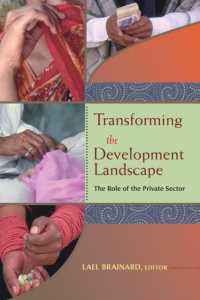- ホーム
- > 洋書
- > 英文書
- > Politics / International Relations
Full Description
What were the Founding Fathers really thinking when they gathered in the Pennsylvania State House to draft the United States Constitution? When answering this question, most have relied on The Federalist Papers, which was first published in book form after the close of the Convention, in 1788. To this day, the book's status is sacrosanct for most Americans. Yet as David Brian Robertson shows, the Papers represented one side of the debate and does not fully capture the political sensibilities that produced the U.S. Constitution. Robertson, drawing from the full range of contemporary sources and not just the Papers, provides a truly authoritative account of the founders' collective political reasoning during the Convention.
Organized thematically, each chapter covers a crucial Constitutional issue: the respective roles of the executive, the judiciary, and the legislature; the balance between the federal government and the states; slavery; and war and peace. In virtually every instance, the process was decidedly political, fractious, and piecemeal. As much as they wanted to design the government that would best serve their people, the Founders struggled to balance their broad ideals with self-interested policies and procedures. Robertson's boldly revisionist account of the political horse-trading that dominated the Convention not only greatly enriches our understanding of the nation's founding; it also elucidates why the government they created has proven so difficult to use.
Contents
Principal Speakers at the Convention
Abbreviations
1. Introduction
Part 1: The Illness and the Cure
2. The Setting
3. The Remedy
4. Controlling Republican Politics: The Main Challenge
5. Broad Nationalism: The Politics of Virginia's Plan
6. Narrow Nationalism: The Virginia Plan's Opponents
Part 2: The Politics of Building Government Institutions
7. Selecting U.S. Representatives
8. Selecting U.S. Senators
9. Congressional Independence
10. Selecting the President
11. Presidential Independence and Isolation
12. The Courts and a Bill of Rights
Part 3: The Politics of Government Power
13. Federalism
14. Slavery
15. Economic Authority
16. National Security and Foreign Policy Authority
17. The End Game
18. Conclusion: A Republic If You Can Keep It
Appendix 1: Chronological Sequence of Constitutional Convention Decisions
Appendix 2: The United States Constitution and accompanying documents from the Constitutional Convention








